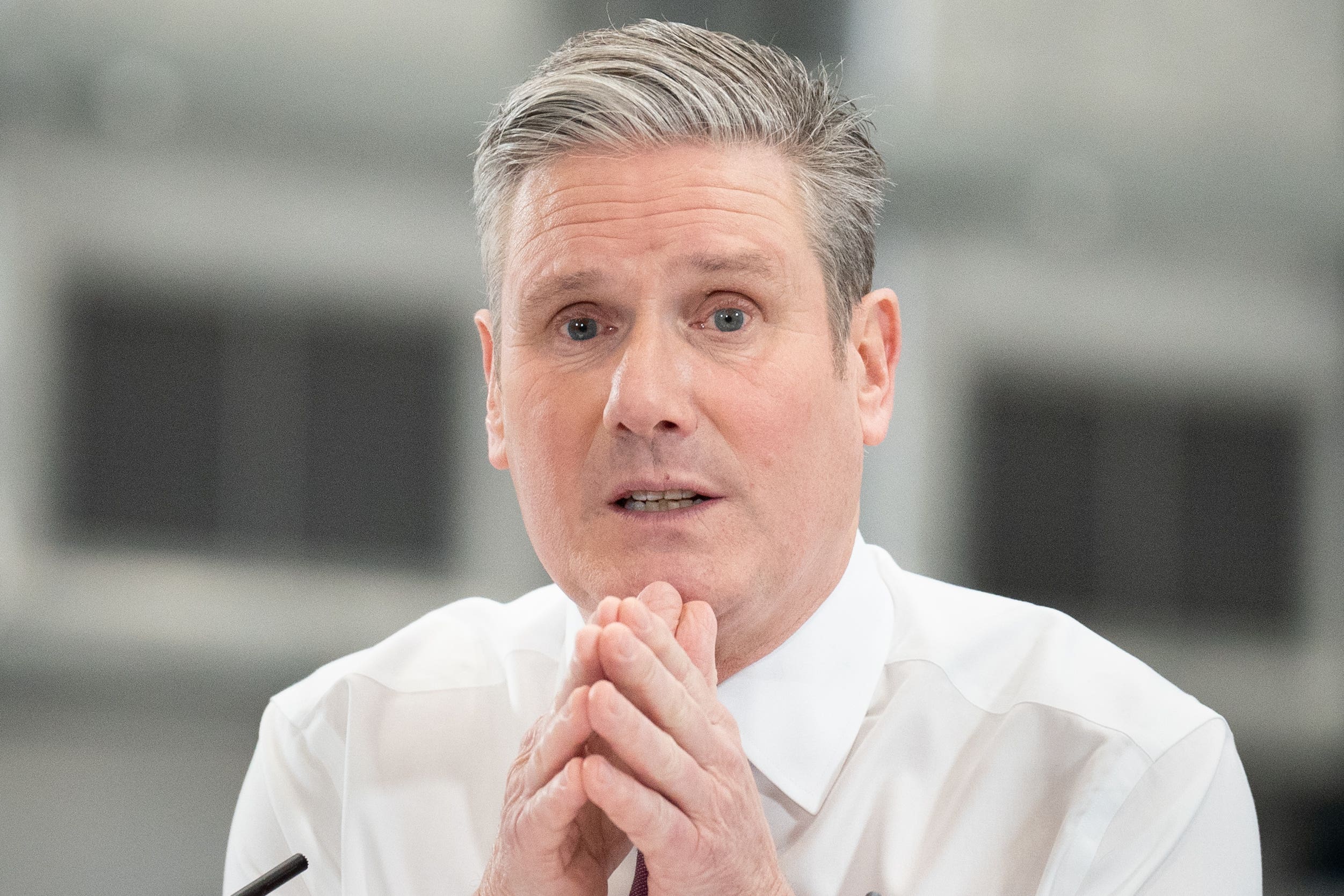What does Labour’s new ‘campaign guide’ tell us about its policies?
The party’s newly published pamphlet is a frustrating mix of some highly specific initiatives and others that are either vague or raise huge practical questions. Sean O’Grady has read it so you don’t have to...


Some decades ago, the Conservatives and then New Labour used to produce thick compendiums for their candidates and party workers at general election time. The Conservative Campaign Guide was the model – a volume containing killer stats, quotes, boasts, and attacks on opposition parties and personalities of a kind that would be unlikely to pass a present-day fact check, but proved useful on the doorstep and the stump.
Thick enough to cover every policy area but still compact enough to fit into the pocket of a Barbour jacket, this portable guide was replicated by Tony Blair’s Labour Party, albeit in a “modern” Filofax-style ring binder. Anyway, in a renewed spirit of campaigning professionalism, Labour has now revived the idea, producing a document titled Let’s Get Britain’s Future Back.
Although the new document is much flimsier, in every sense – and of course, thanks to the internet, is easily available to the general public – it might be best thought of as a pilot for the manifesto – and, to mix the metaphor, as the party firing the starting pistol on its “long campaign”.
What does ‘Let’s Get Britain’s Future Back’ mean?
Nothing. A good test of the emptiness of a political slogan is to reverse it, and then try to judge whether any political party would ever adopt the resulting mantra. Thus, to take Labour’s most fatuous campaigning theme ever, “Forward Not Back” – deployed during the non-event that the 2001 general election turned out to be – one is confronted with the question of whether, absent this statement, any voter could possibly have assumed that the party might be in favour of going “Back Not Forward”.
Similarly, if a little literally, it’s not really possible to get Britain’s future – or even its past – “back” from anywhere. Unless you’re Doctor Who or Marty McFly.
Is that unfair?
A bit. The pamphlet is a rather frustrating mix of some highly specific (and apparently costed and thought-through) initiatives, and others that either are vague, are without any timescale, or raise huge practical questions.
So, for example, every voter can understand this, on page 22: “Recruiting 6,500 more teachers to ensure every child is taught by a specialist, paid for by ending tax breaks for private schools.” (Though how much we need to pay to get people to teach physics is, of course, another matter). The sections on renewable energy – full of stuff about gigawatts, “energy bills cut once and for all” and 500,000 new jobs – and on the broad principles of the fiscal rules are also reasonably plausible, if ambitious.
On the other hand, the section on youth crime, a vital subject, is upbeat but starkly unspecific, saying that Labour will “give teenagers the best start in life with new youth hubs, containing mental health staff and youth workers to tackle the crisis in mental health, give teenagers the support they need and prevent knife crime”. How and what support teenagers need in such circumstances is not even lightly hinted at.
Are there any hostages to fortune?
Given Keir Starmer’s inherent habitual caution, there are some striking ones. For example, you might not want to be a Labour minister trapped in a TV studio in 2028 or so, being asked about the progress you have made in delivering the following across Britain: “We should all have opportunities and be able to enjoy a good life, with a good job, a secure home and a good standard of living. We see the expansion of opportunity as key to growth – and high and rising standards in education as the best route to enabling everyone to achieve their aspirations.”

It’s also notable, in this context, that Labour is sticking with its promise “to secure the highest sustained growth in the G7” – something that will obviously be almost entirely out of Rachel Reeves’s hands.
Without being unduly sour, none of this is going to happen, is it?
But isn’t this a programme for a whole decade?
It is, and that’s just as well given the scale of the “missions” Starmer has set himself, along with the lack of money and labour – and, therefore, that the putative first term of a two-term Labour administration won’t have that much to show for itself.
Peter Mandelson and Pat McFadden, who have some campaigning and governmental experience from the days of New Labour, understand the need to manage expectations and not to promise that which they cannot deliver. The danger, as this paragraph highlights, is candidates who can’t help their rhetoric and allow themselves to be overcome by the vision of a new Jerusalem.
What does it tell us about the campaign?
It will be extremely Starmer-centric. This short pamphlet somehow manages to pack some 12 images of Starmer into its 24 pages, including one of the Labour leader in combat gear and, equally inevitably, one of him cuddling a baby. He describes himself as “a man on a mission”, with a near-evangelical zeal that is at odds with the nation’s dismal economic resources.
The Starmer signature also appears twice, and there’s a sprinkling of union jacks – this a proudly patriotic and unionist tome – though there’s not much about Scotland, Wales or Northern Ireland. Although it lacks the usual biographical reference to his father being a toolmaker, on this occasion Starmer goes so far as to define himself as “working class”, which is pushing it for the child of an engineer and a nurse, ie two professionals, who was brought up in an owner-occupied home.
For Kremlinologists, it’s notable that the other Labour figures glimpsed in the guide include Rachel Reeves, Bridget Phillipson, Yvette Cooper, Anas Sarwar, Wes Streeting, Ed Miliband and Angela Rayner.

The document, naturally, is focused on the voters’ main concerns – the economy, public services and migration – though it has some notable omissions. Aside from a couple of critical references to “Tory failure”, the mission statement fails to mention Brexit, international aid, the trade unions, transgender rights, poverty, or Palestine. If these or other topics do arise during the election campaign, the official line is, so far, absent.
The most worrying line?
No doubt direct from the laptop of Streeting, the shadow health secretary, is this rather chilling warning about the National Health Service: “If we are to truly get the NHS back on its feet, we need to reform it. Yes, investment is needed, but pouring ever-increasing amounts of money into a system that isn’t working is wasteful in every sense. The message of modernise or die is not a threat but a choice.” They may as well have written: “We’re afraid there is no money.”
How will they pay for their plans?
Not much on that, and there won’t be until the general election – and possibly not even until Reeves’s first Budget. In the past, Labour’s problem has sometimes been that its plans were so ambitious and so unsustainable that the leadership didn’t dare talk about how they would be funded. Now they’re a bit shy, because the truth is, they won’t be spending what they’d love to, and what the public nowadays demands – hence the expectations management along with the downgrading of the £28bn green deal.
Next time round, then, all Labour plans will be subject to Reeves’s new fiscal rules and some new and strengthened economic watchdogs, so everything will be subject to, and constrained by, that. On, say, 1 per cent growth a year, that will not amount to much for significant projects, such as replacing HS2 or uprating tax thresholds.
All that said, it does seem as though the part about raising money by abolishing non-dom tax status is doing some very heavy lifting. According to the latest analysis, this would raise something between £1bn and £3bn a year, depending on how many of the super-rich decide to relocate – quite small change in a total tax take of, say, £900bn. This non-dom cash is being allocated to three pledges:
- paying doctors and nurses overtime to work evenings and weekends in an effort to cut the NHS backlog
- quicker cancer diagnosis and the start of treatment within 30 days
- free school breakfast clubs and better-quality teaching with more specialist maths and science teachers
So what is the main message?
It’s actually very short, very potent, and – like all the best ones – was probably mined from a focus group: “Nothing seems to work in Britain. And that’s why it’s time for a change.”
Join our commenting forum
Join thought-provoking conversations, follow other Independent readers and see their replies
Comments
Bookmark popover
Removed from bookmarks